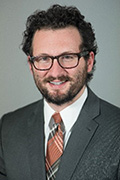 Joshua Stanton knew that litigating cases during the COVID-19 pandemic would present some daunting challenges when he joined the Vanderbilt Law faculty as a Criminal Justice Clinic Fellow in August.
Joshua Stanton knew that litigating cases during the COVID-19 pandemic would present some daunting challenges when he joined the Vanderbilt Law faculty as a Criminal Justice Clinic Fellow in August.
After earning his law degree at New York University and serving as a law clerk to Judge Jon Phipps McCalla of the Western District of Tennessee, Stanton had worked as a public defender in Memphis for four years. He was working as a criminal defense lawyer at Quinn Emanuel Urquhart & Sullivan in New York when he accepted the newly endowed Criminal Justice Clinic Fellowship at Vanderbilt last spring.
The fellowship offered Stanton an opportunity to connect his passion for defending indigent clients with his interest in teaching and mentoring. He will be working with Associate Dean for Clinical Affairs Susan Kay ’79 for two years to supervise students in Vanderbilt’s Criminal Justice Clinic.
The clinic is assigned several clients each semester. Last fall, Kay, Stanton and their students faced the immediate challenges of adapting to the limitations imposed by social distancing. Pairs of students normally visit the Metro Nashville jail to meet with their clients. But with access to clients limited to a single computer screen in a small room, only one student at a time can visit the jail to interview clients in custody. “Having to use a screen to do interviews also hinders our ability to do a number of other things that are normally routine during visits, like going over written documents with clients and getting them to sign necessary forms,” Stanton said.
With courts’ capacity to hear criminal cases greatly reduced and jury trials prohibited due to the pandemic, students in the Criminal Justice Clinic last fall worked on bond motions seeking release for clients awaiting trial, hoping to reduce their risk of exposure to COVID-19 by getting them out on bail. “When bond motions are denied, our clients have to choose whether to take a guilty plea to get out of custody or to stay in jail awaiting trial, where their risk of contracting COVID is higher,” Stanton said. “When clients take a guilty plea just so they can be released, there’s a conviction on their records. That’s a big downside.”
Stanton is concerned about a crippling backlog of cases hitting courts in the coming months as fewer cases are adjudicated during the pandemic. “Cases are getting pushed back and pushed back and pushed back,’ Stanton said. When two students were able to argue bond motions in court last fall, he considered it a victory for them and their clients.
Despite the difficult conditions, some students have opted to appear in court when permitted. “Students are navigating the situation as well as possible and developing relationships with clients,” Stanton said. “They’re learning by doing the nuts and bolts of any criminal case—reviewing discovery, developing investigation plans, drafting motions, and even negotiating with prosecutors.”
As a public defender, Stanton recalls learning to manage a heavy caseload and navigate a bureaucratic system. He has helped his students apply those lessons to defending their clients during the pandemic. “You take it one day and one case at a time. You know that there’s a benefit to working hard for your client—and you learn to be strategic about selecting things in the system you can successfully fight against,” he said.
Students typically handle two cases over the course of a semester in the clinic. “We typically don’t represent people who are facing decades in prison, but we do represent people in fairly serious felony cases,” Stanton said. “Students are closely supervised, and I believe our clients, even those facing serious charges, get equal or better representation with us than they would elsewhere given the significant amount of work students do under our supervision.”
Kay, who launched the Criminal Justice Clinic in 1980, has directed the law school’s clinical education program since 2001. She is excited about the fellowship’s potential to increase the level of supervision and mentoring students receive and help aspiring clinical law faculty gain experience.
“We are delighted to have Josh working with us – in addition to his experience as a public defender, he brings a fresh perspective and a keen intellect to our clinical program. We are indebted to the Charles Koch Foundation for funding this position. Their goal is to increase the number of students who make a commitment to serving the community by becoming public defenders. Having Josh in the clinic has allowed us to increase the number of students who are being exposed to criminal defense practice through our clinical course,” Kay said.